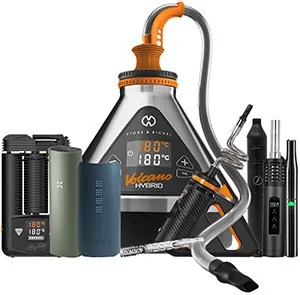Vaporizers may no longer be sold online within the Netherlands from 1 July 2023
Please note: that the links below refer to the publications on the website of the Netherlands Food and Consumer Authority and unfortunately only published in Dutch. Please therefore use your own online translator to read these publications.
The new laws/regulations as of 1 July 2022
Heaters for tobacco and tobacco products | Smoking and tobacco | NVWA
https://www.nvwa.nl/onderwerpen/roken-en-tabak/verhittingsapparaten-voor-tabak-en-tabaksproducten
Heating devices for tobacco and tobacco products
From 1 July 2022, rules will apply to heating devices intended for the consumption of tobacco and tobacco products.
The legislator has added heating devices for tobacco and tobacco products to the so-called 'related products', which means that all kinds of legislation around smoking and tobacco now also apply to these devices, such as the advertising ban, display ban and age limit rules when selling tobacco. According to the legislator's definition, heating devices are devices used for the consumption of tobacco and tobacco products by heating, saying: tobacco is heated with specially designed tobacco products or by adding loose tobacco or mixtures with tobacco yourself. Here, the legislator also explicitly includes vaporizers in its definition of heating devices for tobacco and tobacco products.
Ban on remote sales of smoking products within the Netherlands from 1 July 2023
From 1 July 2023, it will be prohibited within the Netherlands to sell smoking products 'remotely' (online).
For cross-border sales (to countries outside the Netherlands), the ban does not yet apply to electronic heating devices (vaporizers). But the ban is expected to apply to these products from 1 January 2024. https://www.nvwa.nl/onderwerpen/roken-en-tabak/verbod-op-verkoop-van-rookwaren-op-afstand
What are vaporizers and why and what do people use vaporizers for?
First of all: by definition, a vaporizer is not used for the consumption of tobacco! By definition, a vaporizer is used to release the active ingredients of recreational or (medicinal) herbs by heating (not burning!), so that the active ingredients turn into vapor and can be inhaled. At a certain temperature, herbs release their active ingredients. Vaporizers allow pure herbs to be heated to the right temperature to release the active substances so that they can be inhaled in the form of vapor. This heating is done by direct contact (conduction), or by a hot air stream (convection). Vaporizers are fine for recreational use, but they are also suitable for medical use. Without combustion and smoke, you only experience the pleasurable or medicinal effect of (medicinal) herbs, or cannabis, without tobacco. The main advantage of vaporizing over smoking is that the plant material does not burn. Herbal vapor made without burning is much purer, more effective, cleaner and therefore healthier, than smoking and/or burning as incense; many of the harmful substances caused by burning are not present in herbal vapor. The herb vapor created with a vaporizer is ideally tar-free.
Since 2000, vaporizers have been patented high-tech devices, which are being innovated on at a rapid pace by various brands/manufacturers. This allows consumers to vaporize (vaporize) their herbs completely safely and with extreme precision.
What is the difference between smoking and vaporizing?
Burning as incense involves combustion and charring, while smoking involves burning tobacco or herbs. Both methods of smoking produce large amounts of unhealthy, toxic by-products, including tar (solid particles) and nitrous oxide (gas). All these by-products are harmful to health and irritating to the throat, mouth and lungs.
Conduction and convection are the two most popular heating methods in vaporizers to vaporize the active ingredients of recreational or (medicinal) herbs. Conduction means heating by direct contact with a heat source. Convection is heating a material with hot air blown through a heating element. In both conduction and convection, the herbs are not burnt and therefore there is no ash after vaporization; the remaining material has only lost its colour and smell.
Why, according to us and the trade association for smartshops in the Netherlands - Vereniging Landelijk Overleg Smartproducten (VLOS) - should vaporizers not be covered by the Tobacco Act?
The aim of the law is to get and keep people off tobacco: Government measures to discourage smoking / Government measures for a smoke-free generation. Vaporizers have been sold for almost 2 decades now, and these are just now being sold, to help get people off tobacco! Because online and offline sellers of vaporizers will have to comply with these new rules, it will become much more difficult to market and sell vaporizers to tobacco users. As a result, tobacco users will be much less likely to buy a vaporizer and tobacco users will be much less likely to switch from smoking tobacco to vaporizing recreational or (medicinal) herbs without tobacco, which will result in many tobacco users staying on tobacco instead of quitting. Vaporizers are a means to achieve the purpose of the law and then the sale of devices that help achieve the purpose should not be made more difficult. Apparently, this is all the result of lack of knowledge regarding what vaporizers actually are (confusion of speech/understanding regarding vapes) among the policymakers, and they have not realized that this new law/regulation will actually have a counterproductive undesirable adverse effect on public health, instead of a desired beneficial effect.
Note: do not confuse vaporizers with vapes
Vaporizers should not be confused with so-called vapes. Vapes are quite different from vaporizers. Vapes are so-called e-cigarettes. The e-cigarette or electronic cigarette is an electronic device that, by heating e-liquid, forms an aerosol, which is then inhaled by the e-cigarette user. The composition of the liquids used consists of propylene glycol, glycerol in which nicotine may or may not be dissolved along with flavorings. As to whether or not vapes / e-cigarettes are harmful to health, we will not comment further here, but it should be made absolutely clear to the relevant policy officials, that vaporizers are totally different, from vapes / e-cigarettes.
Did you enjoy reading this article and do you like to write yourself? We are always looking for people who share our passion for natural products, who can also translate this into great texts. And we have an interesting reward for this. View all information for writers.
 Blog Organic Cannabis Growing
Harvesting your home-grown cannabis
When will you harvest? That's what every grower is concerned with. When the seed germinates you are already looking forward to the harvest. If you [..]
19-03-2021
7 minutes
Blog Organic Cannabis Growing
Harvesting your home-grown cannabis
When will you harvest? That's what every grower is concerned with. When the seed germinates you are already looking forward to the harvest. If you [..]
19-03-2021
7 minutes
 Blog Cannabis
Tips for the best cannabis plants in 2021
We are in the year 2021! A year in which people will hopefully continue to be committed to our planet earth. While I believe that the governments, pre [..]
13-10-2020
8 minutes
Blog Cannabis
Tips for the best cannabis plants in 2021
We are in the year 2021! A year in which people will hopefully continue to be committed to our planet earth. While I believe that the governments, pre [..]
13-10-2020
8 minutes
 Blog Smart Products
Alcohol substitutes: Sirius Smart Drugs
In my previous blog I wrote about the effects of alcohol. I wrote about the first drunk night of my life, the notorious hangover and what you can do t [..]
Blog Smart Products
Alcohol substitutes: Sirius Smart Drugs
In my previous blog I wrote about the effects of alcohol. I wrote about the first drunk night of my life, the notorious hangover and what you can do t [..]












 Nederlands
Nederlands Italiano
Italiano Deutsch
Deutsch Français
Français Português
Português Español
Español Polski
Polski